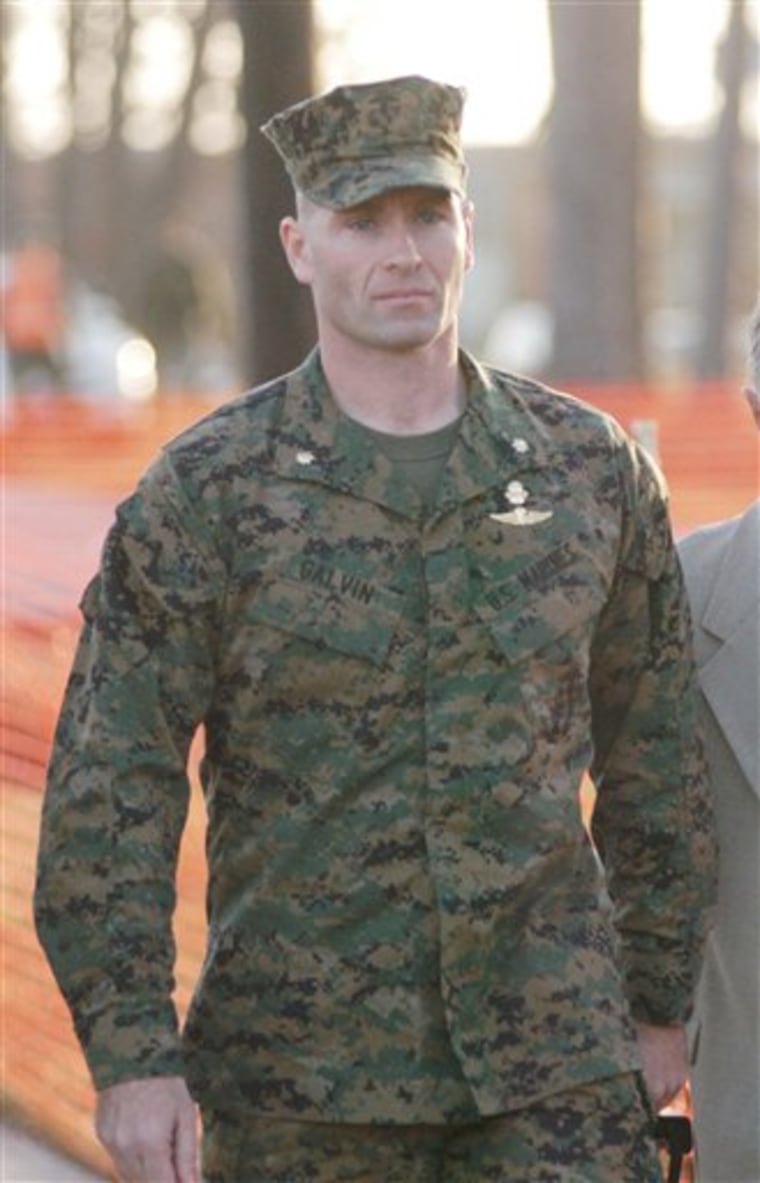Two Marines involved in a shooting that killed as many as 19 Afghan civilians testified Wednesday that their unit was responding to an ambush so intense that the crossfire took out tree branches as their convoy of Humvees fled from the scene.
"You could see branches falling across the road ... all along our route," said Sgt. Benjamin Baker. "We were taking semiautomatic small arms fire all along this road."
Baker's testimony followed that of Sgt. Brett Hayes, who told the administrative panel investigating the conduct of two officers involved in the shooting that the convoy was fired upon at least three times after it was attacked by a car bomb.
Hayes said the blast knocked a gunner in his vehicle out of the turret. The gunner returned to his position and began firing, shouting that he was taking small arms fire from both sides of the road near a bridge over a dry riverbed. Hayes said he heard fire from AK-47 rifles and cracks of the bullets passing overhead.
"I'm 100 percent sure we were taking fire," Hayes said. "And I'm sure we had to kill some guys who were shooting at us."
Two officers' roles examined
Hayes recalled the March 4 gunfire during the second day of testimony at a rarely used Court of Inquiry, which will recommend whether two officers — Maj. Fred C. Galvin, 38, commander of the 120-person special operations company, and Capt. Vincent J. Noble, 29, a platoon leader — should be charged with a crime.
The Marine Corps last used such an administrative fact-finding hearing more than 50 years ago to examine the drowning of a trainee.
Afghanistan's Independent Human Rights Commission concluded the Marines had fired indiscriminately at pedestrians and people in cars, buses and taxis at six locations along a 10-mile stretch of road. An Army investigation concluded 19 Afghan civilians died and 50 were wounded, but attorneys for the two officers insist that the death toll was lower and that the shooting was justified.
Baker told the court the van blew up shortly after passing his vehicle, the first in the six-vehicle convoy that was headed back to the unit's base after a patrol to the Pakistan border.
Hayes said that when his Humvee resumed its course after the bombing, the vehicle was fired at again from the right side of the road. The gunner fired back, then fired once or twice at a 45-degree angle toward the road, Hayes said, adding that he didn't know the intended target.
Hayes said that he gave the gunner a 200-round can of ammunition after the previous can was exhausted, and that the gunner used a hand-held rifle to fire for a time. When the gunner realized he had been hit in the arm with shrapnel, Hayes got into the turret for the trip back to the base. Hayes said he didn't fire the weapon.
Translator reported hearing distant gunfire
Also testifying Wednesday was translator Habib Sahar, a U.S. citizen working in Afghanistan for the military. An official inadvertently locked the courtroom door after a closed classified session, and reporters were unable to hear his testimony.
Mark Waple, a civilian lawyer for Galvin, said Sahar told the court that from his seat in the rear of the third Humvee in the convoy, he heard distant gunfire following the car-bomb explosion.
The company was on its first deployment after the 2006 creation of the Marine Special Operations Command. After the shooting, eight Marines were sent back to Camp Lejeune, and the rest of the company was taken out of Afghanistan.
Maj. Gen. Dennis J. Hejlik, the commander of the Marine Special Operations Command, later said the unit responded appropriately. Marine Corps commandant Gen. James T. Conway also criticized an apology issued by an Army brigade commander, calling it premature because an investigation remained under way.
